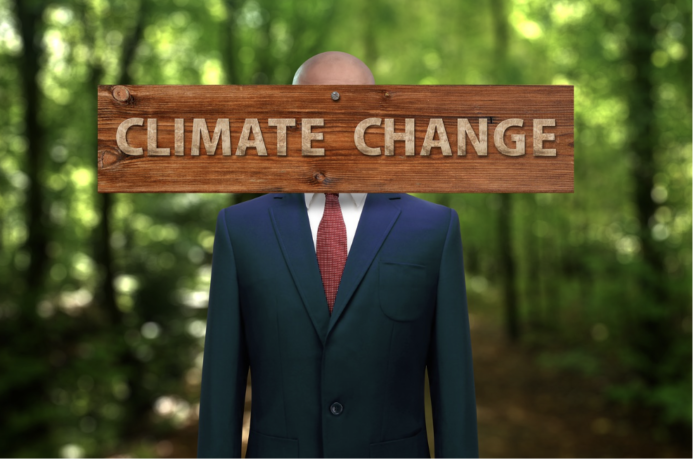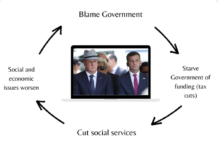So far in the election campaign the Green Party has been silent about the role of organic agriculture in it’s vision for the future.
Just as with the Green Party’s quiet and mumbled response to National’s policy for commercial release of GE, their silence has raised questions about the integrity of the Party’s policies.
To be fair, it should not just be the Greens talking about local and global action to rebuild soil health and drive carbon sequestration.
Yes it’s their gig and what we expect the Greens to be advocating for. Their absence from the debate has raised suspicion of shennanagins and doublespeak.
But the importance of regenerative agriculture in mitigating climate change is bigger than just the Greens and should be on the agenda of every Party.
There is an opportunity cost in all our political leaders failing to recognise the multifaceted benefits of regenerative organic agriculture.
Longer-term, the price to pay is not just in the continued reliance of farmers on high-cost fertiliser, chemical inputs and patented GE seeds.
Trust the Green Party
The good news is that the Green Party policies on both organics and on regulating Genetic Engineering are really good. Green Party policy on the website includes:
- Support the limited and ethical use of non-genetically engineered (GE) biotechnology, and GE biotechnology in containment and ensure that it is regulated to:
Prohibit release of viable GE organisms into water, air, land or soil ecosystems
Support strict liability and a polluter-pays approach for biotechnology producers
Uphold the Precautionary Principle
Permit case-by-case evaluation of GE in containment
Be process-triggered (so will test and trace GE foods)
- Incorporate soil carbon, the health of biological soil systems and soil water within climate change response frameworks, acknowledging their vital role, in conjunction with plant life, in sequestering carbon in the soil and cooling the area
- Assist farmers to transition to regenerative farming, including through on-farm regenerative organic advisory services, financial tools to assist with the upfront cost of transition, funding for regenerative primary industry bodies, and support for certification
The Greens also rightly recognise the connection across different policy areas – Environmental Protection, Sustainable Communities, Food, Climate Change, Trade, Animal Welfare, Biosecurity and Conservation.
What the Experts say
Not surprisingly, the experts don’t agree.
The contrast of opinion is described very well in the article “The Real Climate Impact of Organic Farming” by Lisa Held.
On one hand a research scholar at Princeton University says that organics is not going to be a meaningful part of the climate solution. Another scientist who oversees soil health research at the Rodale Institute, says there’s no doubt that organic systems could reduce greenhouse emissions and improve carbon sequestration.
Rodale is also moving towards “regenerative organic” practices that focus not just on the absence of pesticides, but on the many practices that build soil and the climate-friendly reasons to do so.
Organic agriculture offers society much more than ‘less chemical sprays’.
Though many New Zealand farmers are still locked in to the old system, things are changing.
Organics represents a more nuanced and complex relationship between humans and our food than the past 50 years of industrial intensification allows.
As an alternative to today’s market-failure and orthodoxy to ‘make farmers pay’ we need to be providing subsidies and funding to make the transition.
50% of Ireland’s Farmers are open to transition to organics in the next 5 years.
It would be useful for politicians and industry players to find out if kiwi farmers have a similar level of openness to organics as Irish farmers have.
Benefits of agro-ecology
The diversity of crops in mixed regenerative agriculture provides increased resilience to climate change, drought and pests.
Animal welfare is a cornerstone that is less widely recognised. Free range is just the start of it.
More localised regenerative organic food systems give greater resilience for all countries to climate disruption. It can make them less totally reliant on a vulnerable global supply chain for synthetic inputs and the importation of food.
Nutrient density in organic food offers a solution to harmful impacts on soil health and the loss of nutritional value that are major negative outcomes of the first Green Revolution.
This is what the Green Party and other politicians should be talking about, and budgeting support for farmers to change.
The Industrial green revolution is the wrong direction
While the Green Revolution had many benefits, it was not without fault—one of its most significant faults was its impact on the health of our soil.
The Ecologist reports that the the Green revolution is locking African farmers into a system that is not designed for their benefit, but for Northern multinational corporations.
The research examines the Alliance for a Green Revolution in Africa (AGRA), a nonprofit launched by the Bill & Melinda Gates and Rockefeller foundations in 2006. In 14 years, AGRA has collected nearly a billion dollars in donations and disbursed $524 million, primarily in thirteen African countries, promoting the use of commercial seeds, chemical fertilisers and pesticides.
The paper documents the results – slow productivity growth, no significant increases in food security or small-farmer incomes, and worsening hunger in most of AGRA’s target countries.
Timothy Wise, the lead author said: “It’s a failing model, failing results; it’s time to change course.”
Vandana Shiva, an advocate for agroecology says “globally, the subsidies are $400bn a year to make an unviable agriculture system work.”
So a few billion dollars to support the transition to organics in New Zealand is more than reasonable when compared with global industrial farming subsidies of $400bn.
At the heart of regenerative organic agriculture is Soil Health
It’s not a coincidence that “Soil and Health” is the name of the organisation established in 1941 with the guiding principle oranga nuku, oranga kai, oranga tāngata / healthy soil, healthy food, healthy people.
A new report by Friends of the Earth raises concerns that Biotech companies are developing genetically engineered microbes for use in agriculture, including the largest agrichemical corporations — Bayer-Monsanto, Syngenta, and BASF. The first of these products are already being used across millions of acres of U.S. farmland.
The threat from new Gene Edited Soil Microbes
The release of live genetically engineered microbes in agriculture represents an unprecedented open-air genetic experiment. The scale of release is far larger. The odds of containment are far smaller than for GE crops.
“Microbes can share genetic material with each other far more readily than crops and can travel great distances on the wind, so the genetic modifications released inside GE microbes may move across species and geographic boundaries in unpredictable ways,”said Dana Perls, food and technology program manager at Friends of the Earth.
Releasing genetically engineered microbes in agriculture could enable new associations to form with weed or pest species with unforeseen and potentially irreparable consequences.
‘Biologicals’ – Work with, not against Nature
Genetic Engineering is good for companies seeking Intellectual Property and patents but it not needed to harness the power of microbes.
Hundreds of naturally-derived microbes – ‘Biologicals’ — are available for use in agriculture already, as biostimulants to improve plant growth, biofertilizers to improve crop nutrition, and biopesticides to manage pests and diseases. Billions of unexplored microbes exist that can be a source of discovery and benefit for generations to come without the use of genetic engineering.
New Zealand researchers at Lincoln University know this already, and show how science can help the transition to sustainable organic agriculture.
One of their projects will harness the power of humble natural strains of soil fungi to increase the efficiency of nitrogen use by plants and reduce nitrogen losses. Research to date indicates this has a strong potential to mitigate both greenhouse gas emissions and reduce nitrogen loss to waterways.
The Market has failed
Politicians in New Zealand and around the world, must support Farmers to make the transition.
The long debate over fart taxes and charging for farm emissions is a distraction from the bigger picture.
Global industrial agriculture is a failed system that is not meeting consumer demand for urgent change in the face of climate change and loss of natural biodiversity.
Of course agri-chemical companies want more of the same. But their price is too high too pay. Regenerative organic agriculture has to be part of the solution.
Even if the Green Party has been cowed into silence on regenerative organic agriculture and for whatever reason they don’t want to talk about it- their election tagline is still correct: the time is now.
Jon Carapiet: Born in Ghana and educated at Cambridge and Auckland Universities, Jon is a consumer researcher and advocate, photographer and writer. Jon started talking about valuing and protecting Brand New Zealand in the early 2000’s and is spokesman for GE-Free NZ (in food and environment). Twitter jon@brandnewzealand





I wouldn’t expect too much from the Green Party in this regard because they’ve long since ceased to have any relevant environmental policies. None of their leaders have any valid science credentials or practical experience in the field. They’re more interested in childish protests that get their faces on TV: Maybe they should rename themselves the Narcissists Party.
Jon, I agree with the thrust of your argument and along with that the fact that change wont come unless government match their rhetoric with action in the form of support for Farmers and Growers. You will agree that this government has pushed farmers generally in the direction of good water and nutrient use and of course emissions, methane.
Of course livestock farmers are the easy targets here but not so much GROWERS. The media leaves them alone for the most part. The link below talks of the high Nitrate levels in the south Auckland Pukekohe area leaching from there into the Manukau Harbour. This article was in RNZ for a few hours and then disappeared. Who wants our beautiful vegetables and their growers to be tarnished with a report like this. We love our vegetables but not so much livestock. If the market gardens stopped polluting today it would be 2080 before the problem stopped. Until our government and MEDIA start giving a balanced view of our environmental issues Jon your aspirations will remain just that.
https://www.rnz.co.nz/news/national/493742/high-levels-of-toxic-nitrates-in-water-moving-under-and-through-south-auckland-to-harbour-research-shows
In my opinion:
The most eager and hale and hearty contributors to global climate change is banking. Is so funny. The only thing that’s trickling down economically for AO/NZ is the end of all life on Earth. roger? You little fucking parasite? What’s your opinion on that? Just kidding. Don’t bother, I don’t care what your opinion might be.
The bankster racketeers are everywhere there’s dysfunction because everywhere they go, dysfunction’s soon to follow. Whether it be populations in turmoil, or at war, or in deep debt and deeper shit socially or for the want of basic resources like a potato and a glass of reasonably clean water. There they are. The Banksters. Sucking away like things that suck on other things. Wow! I just had david seymour come to mind. Steady on seymour, there’s nothing to suck on here.
I’m an easy target. I’m easily dismayed. I’m most dismayed by a lack of genuine and proper discourse here within the cold-chuck and verbal-diarrhoea echo chamber AKA TDB’s comment section. And here, is the only place to go, so what does that tell you? It tells me that most of you are fucking stupid, including me. And I mean really, really fucking dumb-as Bro. And soon to be beached-as too.
You really think that the shit that’s bearing down on us is going to somehow be sent packing by a corporate cock-skin in a suit or the twerking evil clown of greed are going to be around when Christchurch runs out of water or when Auckland’s a bullet riddled body bleeding out into a dead ocean? Have you fucking morons not heard the science? That nothing much will be liveable north or south of the 45th parallels ( I heard recently that it’s now the 30th’s. )
And that shit’s on the banks. I’m not fucking joking. All that’s lovely about greed and modern living is wrong. All of it. The Banks have exploited us so efficiently that we’re now in their world, and that world’s on fucking fire.
We need leadership that’s more than a greedy, blank screen ex Air NZ corporate nob twiddler and a timid little Mouse Man to pull us up out of the shit we’re about to crash land tits-up into. I used to write here years ago that we need is an actor to follow a script written by the collective us. Not this quaint, corrupt, neo-liberal, pro-bankster blow job propagandist pretend-electioneering bullshit.
We should crowd-fund a proper actor, I mean a big time person like Matt Damon or Margot Robbie or better yet both of them to speak to us in an adult and respectful way to explain to us that if we don’t unpick the banksters of our backs they will lead us to our certain fucking doom.
I’ve met Margo. I’ve had conversations with her over on-set lunches. She’s a good person.
I recently watched Matt Damon in this film. ‘Stillwater’ https://en.wikipedia.org/wiki/Stillwater_(film). He was outstanding. We should give them a ring. Send an email.
What ever it takes to rip the bankster’s blinkers off our faces because I see one, or both, of two things happening. We’ll lose our Aotearoa/New Zealand and/or then go on fire.
And remember? Most of our politicians are fucking awful, useless, greedy, lazy, unintelligent fuckers standing on the necks of their betters.
I am with you countryboy. We need to break through the knitting circle of old political hands doing the same old things talking the same old talk and measuring with polls to see how much of it we’ve swallowed. And all this majority thing, or following someone with a loud voice, that pushes keys in our heads that make discordant music.
Who has been outstanding in NZ and could be a leader for revitalising the people who aren’t in the front of the lobby queue because those people already paid for their place?
I’ve looked at this story of a guy that lost a leg through that necrotising fascitis, and it said it came from a bruising knock on his thigh in rugby I think. He has gone on to Paralympics. Can we say rise up NZ and totter off to some goal instead of sitting down pointing out, even working alongside, loser, uncommitted politicians. The Party system is too controlling, it’s a machine. Independents can be loose cannons – each one selling snake oil; at its worst. At its best only some have snake oil.
Paralympian Scott Martlew lost his leg as a teenager when a rugby injury led to a bacterial infection. But he refused to let that hold him back and is now targeting a place on the Paralympics podium next year.
https://www.stuff.co.nz/sport/other-sports/300957425/paralympics-near-miss-drives-scott-martlew-and-his-remarkable-story-of-resilience
Fourth. There’s probably no worse place to finish at the Paralympics.-6 r….
Scott’s story: Finding a new passion after a shock amputation
Accident Compensation Corporation https://www.acc.co.nz › newsroom › stories › scotts-story
Rob Hewitt is a hero, very inspiring and particularly devoted to his Maori roots.
Skipped swimming lessons costly
Waatea News https://waateanews.com › …
22 Noem 2022 — Swimsafer Week ambassador Rob Hewitt wants the government to step up with the money so every child in Aotearoa learns how to swim. The former
And ACC giving itself a boost:
https://otakitoday.com/Articles%20-%20Community/Rob%20Hewitt%20%E2%80%93%20extraordinary%20water%20safety%20kaihaut%C5%AB
For several years, Rob has worked with Water Safety New Zealand as an ambassador and kaihautū (leader, presenter). In this role he has been instrumental in developing the Kia Maanu Kia Ora (Stay Afloat, Stay Alive) initiative, which embodies the Māori worldview of the physical and spiritual properties of wai, as integral to water safety.
This concept is embodied in the Wai Puna theory, developed for Kia Maanu Kia Ora by Dr Chanel Phillips (Ngāti Hine, Ngāpuhi), co-director of Te Koronga Indigenous Science Research Themes. It draws on three core pillars – whakapapa, mātauranga and tikanga.
Wai Puna Theory – Wai Puna explained Kia Maanu Kia Ora
https://kmko.nz › wai-p…
Wai Puna is a theory of Maori water safety developed by Dr Chanel Phillips (Ngāti Hine, Ngāpuhi), co-director of Te Koronga Indigenous Science Research Themes.
https://thespinoff.co.nz/atea-otago/06-07-2021/ko-wai-koe-the-connections-with-wai-that-can-keep-us-safer-in-the-water
…That’s an essential shift. Māori account for around 24% of annual drownings, while making up only around 14% of the population. And a Surf Lifesaving NZ report from earlier this year found that the numbers of drownings for Māori have worsened over the last 10 years. Between 2019 and 2020 the rate of Māori drownings exceeded the previous 10-year average by around 28%. Given that Māori have an inherent cultural and spiritual connection to water, it’s difficult for Phillips to reconcile this over-representation.
Getting one useful program to Maori amongst other possibles, with Rob Hewitt to mentor it, could mean going with Labour for the next term. And it would give them a chance to hold their heads up about something.
I am with you countryboy. We need to break through the knitting circle of old political hands doing the same old things talking the same old talk and measuring with polls to see how much of it we’ve swallowed. And all this majority thing, or following someone with a loud voice, that pushes keys in our heads that make discordant music.
Who has been outstanding in NZ and could be a leader for revitalising the people who aren’t in the front of the lobby queue because those people already paid for their place?
I’ve looked at this story of a guy that lost a leg through that necrotising fascitis, and it said it came from a bruising knock on his thigh in rugby I think. He has gone on to Paralympics. Can we say rise up NZ and totter off to some goal instead of sitting down pointing out, even working alongside, loser, uncommitted politicians. The Party system is too controlling, it’s a machine. Independents can be loose cannons – each one selling snake oil; at its worst. At its best only some have snake oil.
Paralympian Scott Martlew lost his leg as a teenager when a rugby injury led to a bacterial infection. But he refused to let that hold him back and is now targeting a place on the Paralympics podium next year.
https://www.stuff.co.nz/sport/other-sports/300957425/paralympics-near-miss-drives-scott-martlew-and-his-remarkable-story-of-resilience
Fourth. There’s probably no worse place to finish at the Paralympics.-6 r….
Scott’s story: Finding a new passion after a shock amputation
Accident Compensation Corporation https://www.acc.co.nz › newsroom › stories › scotts-story
Rob Hewitt is a hero, very inspiring and particularly devoted to his Maori roots.
Skipped swimming lessons costly
Waatea News https://waateanews.com › …
22 Noem 2022 — Swimsafer Week ambassador Rob Hewitt wants the government to step up with the money so every child in Aotearoa learns how to swim. The former
And ACC giving itself a boost:
https://otakitoday.com/Articles%20-%20Community/Rob%20Hewitt%20%E2%80%93%20extraordinary%20water%20safety%20kaihaut%C5%AB
For several years, Rob has worked with Water Safety New Zealand as an ambassador and kaihautū (leader, presenter). In this role he has been instrumental in developing the Kia Maanu Kia Ora (Stay Afloat, Stay Alive) initiative, which embodies the Māori worldview of the physical and spiritual properties of wai, as integral to water safety.
This concept is embodied in the Wai Puna theory, developed for Kia Maanu Kia Ora by Dr Chanel Phillips (Ngāti Hine, Ngāpuhi), co-director of Te Koronga Indigenous Science Research Themes. It draws on three core pillars – whakapapa, mātauranga and tikanga.
Wai Puna Theory – Wai Puna explained Kia Maanu Kia Ora
https://kmko.nz › wai-p…
Wai Puna is a theory of Maori water safety developed by Dr Chanel Phillips (Ngāti Hine, Ngāpuhi), co-director of Te Koronga Indigenous Science Research Themes.
https://thespinoff.co.nz/atea-otago/06-07-2021/ko-wai-koe-the-connections-with-wai-that-can-keep-us-safer-in-the-water
…That’s an essential shift. Māori account for around 24% of annual drownings, while making up only around 14% of the population. And a Surf Lifesaving NZ report from earlier this year found that the numbers of drownings for Māori have worsened over the last 10 years. Between 2019 and 2020 the rate of Māori drownings exceeded the previous 10-year average by around 28%. Given that Māori have an inherent cultural and spiritual connection to water, it’s difficult for Phillips to reconcile this over-representation.
Getting one useful program to Maori amongst other possibles, with Rob Hewitt to mentor it, could mean going with Labour for the next term. And it would give them a chance to hold their heads up about something.
Sorry about twice – I was getting tired but had to get it up. Time is so short and the slap-happy way many are regarding the politics which is showing; up in the polls is alarming me.
Organics will not feed the poor in this country let alone the world. It is ostensibly for the rich.
The poor buy the cheapest most filling food they can buy.
Free range eggs is a good example.
What we need is farming on an industrial scale but without the exports.
Lack of supply equals shortages equals consumer demand equals high prices.
Organics is just elitist food porn.
Its for wankers.
Well done Jon
For your excellent work on this. I have a couple of questions, and spotted a couple of (not critical) typos if you wanted to polish it.
In the Rodale section you say the scientist says ‘could’. And if they did, then for accuracy that’s how they should be quoted, however they have long had evidence and have said that it does. If possible I would remove ‘could’ as it reads more like ‘might’.
‘Another scientist who oversees soil health research at the Rodale Institute, says there’s no doubt that organic systems could reduce greenhouse emissions and improve carbon sequestration.’
This quote from them uses the word could, but unequivocally,
‘If we converted all global croplands and pastures to regenerative organic agriculture we could sequester more than 100% of current annual CO2 emissions.’
Also ‘moving towards’ is somewhat futuristic as a possible outcome, rather than that they have already researched a range of practices that achieve the preferred outcomes, but continue to build on that research …
‘Rodale is also moving towards “regenerative organic” practices that focus not just on the absence of pesticides, but on the many practices that build soil and the climate-friendly reasons to do so.’
Bloody semantics Steffan
now the couple of typos
Genetic Engineering is good for companies seeking Intellectual Property and patents but it not needed to harness the power of microbes.
Needs an ‘is’
But their price is too high to pay. needs just a ‘to’ where ‘too’ is highlighted.
None of it critical if time doesn’t allow, but being more empirical, when valid, rather than could/might would help win a debate I think.